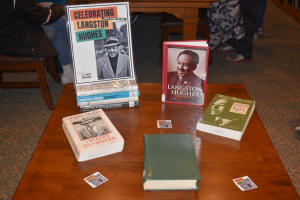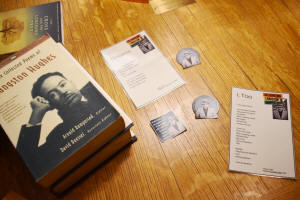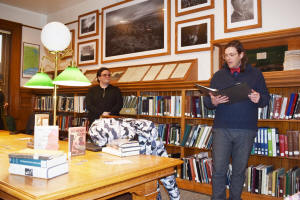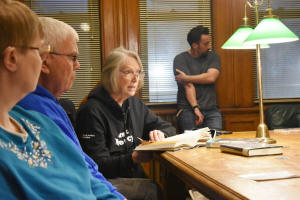Lincoln Public Library Celebrates
Langston Hughes with Poetry Reading
 Send a link to a friend
Send a link to a friend
[March 05, 2024]
Leap Day coincided with poetry at Lincoln Public
Library’s first annual Langston Hughes poetry reading in observance of
Black History month, co-sponsored by the Diversity and Inclusion
Commission of Lincoln.




Over two dozen members of the community gathered in
the Scully Reading Room of the Carnegie building to learn about
Hughes’ life and to enjoy his work read aloud. The Reading Room was
decorated with Hughes’ books, laminated copies of his poems, and
stickers featuring famous lines of his poetry for participants to
take home.

Adam Quine, Diversity and Inclusion Commission member
and pastor of First Presbyterian Church in Lincoln, welcomed the
audience and introduced other Commission members, Eric Struck,
Jennifer Hunt, and Sam Downs. Quine gave some history of Hughes and
reminded the audience of Hughes' connection to Lincoln; as a student
at Central School, Hughes wrote his first poem. (A historical marker
featuring his poem is posted at the corner of Union and 8th
Streets). Quine then opened the floor to anyone who wanted to read a
favorite Hughes poem. Eric Struck of the Diversity and Inclusion
Commission began with “Junior Addict.” Audience member Elaine
Knight, retired District 27 librarian, then volunteered to read her
favorite Hughes poem, “Mother to Son.” She said it was from “the
best children’s poetry book” and “speaks to the strength of mothers,
the power of mothers, and the strength of mothers in raising
children.”
[to top of second column]
|

Other audience members volunteered to read other
poems including “Harlem” which features the famous opening line,
“What happens to a dream deferred?/ Does it dry up like a raisin in
the sun?” from which the Broadway play “A Raisin in the Sun” takes
its name.

Another poem read by an audience member was
“Birmingham Sunday” about the four girls killed by bombs planted by
Ku Klux Klan members in 1963 at 16th Street Baptist church in
Birmingham, Alabama. Quine took an opportunity to talk about Hughes’
influence on Black Liberation Theology and on other well-known
theologians. Quine said that Hughes was the favorite poet of
Dietrich Bonhoeffer, a still-popular German theologian, who resisted
the Third Reich and ultimately was executed in a concentration camp
for helping to plot an assassination attempt on Adolf Hitler.

Other Hughes poems read by audience members included
“I Look at the World” and “Our Land,” and Commission member Jennifer
Hunt read one of her favorites, “Harlem Sweeties.”
Lincoln Public Library librarian Ashley Ried volunteered to read a
final poem and also shared some of what she had learned preparing
for the evening’s event. She said that Hughes gave interviews in
which he talked about his time living in Lincoln. It was not the
worst time of his life, she related, but there were things that
Hughes, as an African-American, was not allowed to do. For example,
Hughes was not allowed to enter the former movie theater on the
courthouse square, the one in the very building that now houses the
Lincoln Public Library annex. Ried read “I, Too,” another of Hughes’
famous poems, as the closing poem.
Quine concluded the evening by inviting everyone to the 2nd annual
Langston Hughes poetry reading on the last Thursday of February in
2025 with 365 days available for everyone to discover their own
favorite Hughes poem to share next time. To learn more about
Langston Hughes and read more of his poetry visit:
https://www.poetryfoundation.org/poets/
langston-hughes.
[Stephanie Hall]
 |